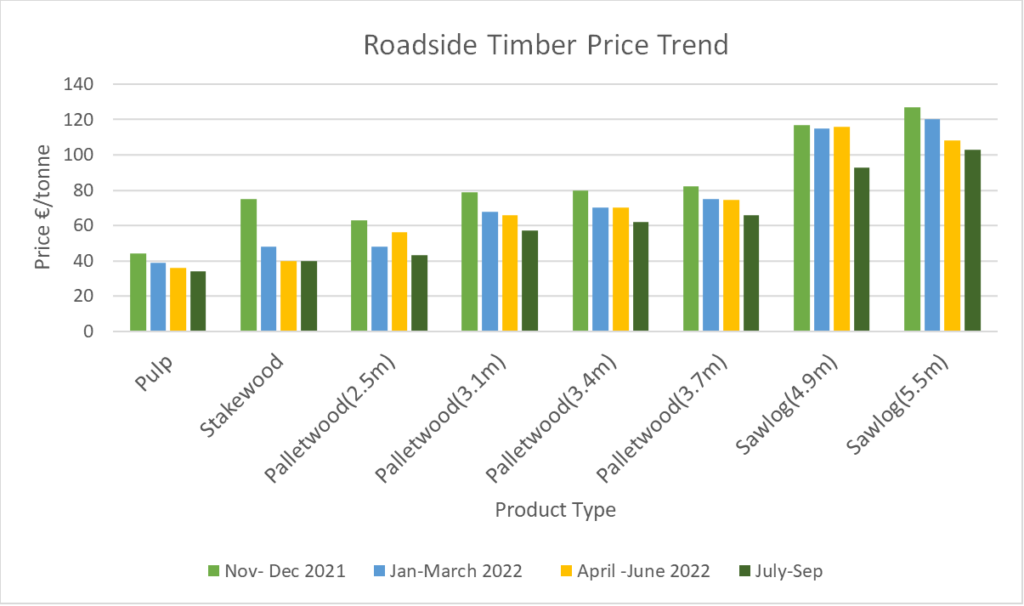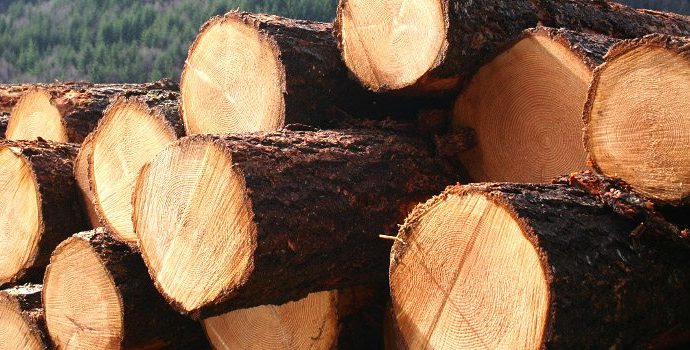Forestry Council Report October 2022

- Market Review
- IFA carried out a timber price survey for the period July-September 2022. The results of the survey are summarised below:
| Product Type | Length (m) | Diameter (cm) | Price € /tonne |
| Pulp | 3 m | < 7cm | 28-40 |
| Stakewood | 1.6 m | > 8cm < 15 cm | 35-44 |
| Palletwood | 2.5 m | > 14 cm | 37-48 |
| 3.1 m | 53-60 | ||
| 3.4 m | 58-65 | ||
| 3.7 m | 60-72 | ||
| Sawlog | 4.9m | > 20cm | 80-105 |
| 5.5 m | 95-110 |
Table 1. Roadside prices excluding VAT for Sitka spruce timber

Figure 1. Roadside Timber Price Trend (October 2021 – October 2022)
- The Department’s licence dashboard for September shows that a total of 351 licences issued which is the equivalent to a weekly average of 88 licences. The breakdown is as follows: Afforestation 78 (22%), Forest Roads 49 (14%), Private Felling 126 (36%) and Coillte Felling 98 (28%). Private Felling licences accounted for 56% of the felling licences issued.

Figure 2. Forest Licence Dashboard Week 4 September 2022
- The graph below shows the total number of forest licences in the system for over 120 days. This time last year (September 2021) there was nearly 5,000 licences in the system greater than 120 days that figure has now reduced to 1650 licences.

Figure 3. Total number of forest licences in the system >120 days

Table 3. Forestry licences in the system as of the 30th September 2022.
- Activity since last National Council
- IFA met with the Department of Agriculture on several occasions to discuss the new Forestry Programme. The following proposals were put forward by IFA:
- The re-introduction of the farmer/non-farmer premium differential.
- The increase in the duration of the forest premium payments to 20 years for GPC 1 – 4 and to 35 years for GPC 5 -10.
- The increase in the duration of the Agro-Forestry (GPC 11) to 15 years.
- The increase in the premium payment rates to better reflect the opportunity cost of planting agricultural land.
- Forest premium rates should be linked to inflation and reviewed annually.
- The introduction of Payment for Ecosystem Services (PES) beyond the duration of the premium payment for land set aside for biodiversity enhancement to compensate farmers for the loss of earning potential on this land.
- The increase in the grant rates paid under the Afforestation and Woodland Creation, Forest Road, and Woodland Improvement schemes to cover the significant rise in operational costs.
- The introduction of a Harvesting Plan grants to assist with the increasing costs associated with road and felling licence applications.
- The introduction of a Carbon Farming voluntary scheme.
- The introduction of Reconstitution scheme for forest owners affected by ash dieback.
- IFA attended a briefing session held by DAFM in July on the Forest Strategy 2023-2027. At the meeting they were advised that Working Group 2 from Project Woodland had identified three requirements from the new strategy (i) increase forest cover, (ii) greater focus on delivering environmental, social, and recreational benefits from new and existing forests and (iii) support mobilisation of the existing timber resource to include expanding the value-added potential of timber within a growing bioeconomy.
- It is proposed that the implementation plan for the new strategy will consist of 8 interventions to achieve the aforementioned requirements identified by WG 2; (i) Forest Creation, (ii) Creation of Agroforestry Systems, (iii) Infrastructure and Technology Investments, (iv) Sustainable Forest Management, (v) Developing skills and empowering people for sustainable forest management, (vi) Open Forest Measure: Social, cultural and heritage forests, (vii) Climate Resilient Reforestation and (viii) Reconstitution.
- The next steps will be to apply to the EU commission for State Aid approval in October 2022 with the aim to launch schemes in January 2023.
- The Independent Regulatory Review for Afforestation, Roads & Felling report was published in June by Philip Lee. The report states that Ireland must have a consent regime (i.e., licence system) rather than an alternative regulatory framework, with statutory standards and conditions, would not meet the requirements of EU law. The report makes 15 recommendations in the report including that:
- mandatory ‘no go’ zones are adopted,
- AA/SEA screening distance of the 15km radius should be maintained, reasonable time-limits for decisions are introduced,
- more plan-led approach to licensing is adopted,
- identify ‘Go To’ areas for forestry,
- adopt standardised conditions and generally binding rules,
- calibrate the licensing system according to risk, thinning and road construction not to be exempted from the licencing system,
- do not adopt a single integrated licence for all forestry activities and
- adopt emergency response standards and plans (in the case of disease, windblow etc.).
IFA issued several press releases to express disappointment with the report, particularly in relation to recommendation to not exempt thinning operations from the licencing process or to recommend single integrated licence system.
- IFA attended several Project Woodland working group meetings to discuss and review Independent Regulatory Review for Afforestation, Roads & Felling report in advance of publication, to discuss report compiled by DAFM on the Shared National Vision for Forestry 2050 following public consultation, the Training Needs Analysis survey has been completed by forest owners and other stakeholders. In a working group field trip was held in Not so Hardy Nurseries, a nursery in Co. Wicklow who are forecasting their future supply based on government afforestation targets.
- IFA attended the National Forestry Conference, Non-Wood Forestry: Who benefits? Who pays? organised by the Society of Irish Foresters on Tuesday, 11th October.
- IFA attended the FOREST Stakeholder Forum on Thursday, 8th September in Trinity College Business School.
- IFA attended a webinar presentation from Prof. Cathal O’Donoghue on The Economics of Afforestation and Management in Ireland: Future Prospects and Plans. The following policy recommendations were proposed:
- Retain the longstanding target of achieving the 18% forest cover target by mid-century.
- Improve the design of forest payments to improve their compatibility with behavioural incentives including going beyond basic compensation.
- Link afforestation public good payments to carbon prices, develop alternative financial instruments to continue to deliver upfront payments
- Develop mechanisms to deal with current inflationary environment to reduce risk by stakeholders and increase confidence.
- Full implementation of the MacKinnon report.
- Develop a national land use strategy to provide a formal framework to make land use planning decisions.
- Review the legislation on forestry and consider the introduction of a single consent covering planting, road construction, management, and felling.
- Aligning Afforestation Incentives and Forestry Guidelines should be aligned to CAP rules.
- Develop a Carbon Neutral Certification with the Cooperatives for Dairy Farms.
- Improve Afforestation Incentives by Increasing Flexibility in relation to the replanting obligation.
- Establish a new Forestry Development Agency.
- Undertake a review of the optimal department location for forestry.
- Review the current afforestation business model to improve scale economies and deliver wider scale.
- Eliminate disincentives and anomalies that arise from the interaction of afforestation and tax and social welfare policy for all stakeholders
- IFA wrote to Minister Eamon Ryan to seek a meeting to the introduction of a financial support package for farmers and landowners to manage ash trees that have been infected by ash dieback in hedgerows along public roads. The health and safety concerns to public road users was highlighted.
- IFA attended the Forest Industry Transport Group meeting, topics discussed; environmental impact of timber haulage, FITG submission to Government, driver resource, licencing issues, Forest Service update, and development of Forest Road scheme 2023.
- There was a 12% increase in the forestry budget to €112m was announced in the 2023 Budget to fund the new National Forestry Programme.
- The IFA Farm Forestry committee met on the 4th August, at meeting Simon White, Limerick was elected Vice-Chair. There was an online Management committee meeting on the 3rd October.
- Any EU/COPA developments
- IFA attended the online joint preparatory and Civil Dialogue Group on Forestry and Cork meetings on the 10th and 14th October.
- The following policy items were discussed: (i) EU Nature Restoration Law, (ii) EU Forest Strategy – Governance – Future of the CDG Forestry and Cork (iii) EU Bioeconomy Strategy (Progress report and next steps & outcome of the EU Bioeconomy Conference 2022), (iv) Forest Europe – Outcome of the High-Level Policy Dialogue on Sustainable Forest Management: Unlocking forests’ biodiversity potential and (v) Forest fires in 2022.
- Upcoming issues
- IFA is organising a lobby campaign to seek that IFA’s proposals in relation to the forestry programme are adopted.
- IFA plans to hold a national conference on ash dieback.
- IFA Farm Forestry committee to meet with DAFM early November, with presentation from the DAFM.
- IFA will attend a COFORD Forestry meeting on 27th October.


